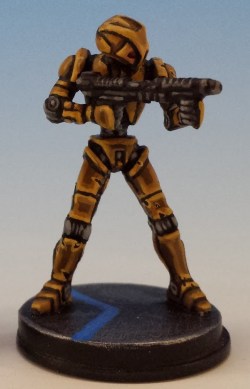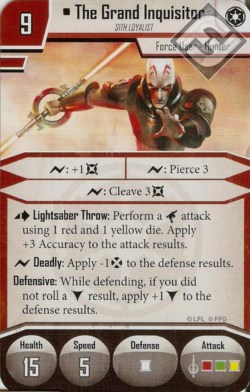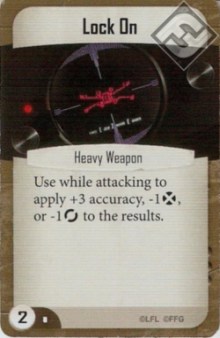The X-Files

HK Assassin Droid painted and photographed by Matthew of www.oldenhammer.com
Dodge?
It’s been a few weeks now since Jodocast.com released their article X-Happens. If you haven’t read it, stop now and read it before continuing here. This piece is a direct response to some of the thoughts and arguments brought forth by Joe.
Just to get you up to speed, in Imperial Assault the white die features one face with this cute little X symbol. As per rules, its effect is:
This result causes the entire attack to miss (the target suffers zero damage).
More specifically, a miss not only causes 0 damage, it also prevents the attacker from applying any conditions as result of this attack, wether they be positive or negative. So overall, this result effectively cancels the attack in its entirety. The origins of this mechanic are firmly rooted in the classic RPG game systems and most notable Dungeons & Dragons. Now the first question is … why? Why does this exist? Joe in his article already nails it:
One of the most amazing properties of the Dodge result in Imperial Assault is that out of everything in the game, it seems to be the source of the most extreme emotions felt by players on both ends of the spectrum. Nothing else in the game can quite make you feel the broad range of emotions as the Dodge.
The dodge result is in the game to make you feel something, good or bad. Increasing the emotions you feel when playing the game creates stronger and longer lasting memories, which is a good thing. Or is it?
All well in X-Land?
I don’t think it is. Or more precisely: I don’t think it’s good in skirmish. The thing about Imperial Assault is that it is split into a story driven part (the campaigns) and a very competitive part where you directly compete against other players. These 2 modes of play have pretty different goals of how they engage the players. Let’s look at the 2 parts more closely.
The campaign is typically played by 3-5 players. One of which is controlling the forces of the empire, while the others each play a rebel hero. In the core box alone, of the 19 imperial deployment cards only 5 have a white die for defense. That is of course including the mercenary cards. On the other hand, of the 6 rebel heroes, 3 of them and all 5 allies defend with a white die. It’s immediately apparent that the rebel faction has a wider selection of characters that use the white die, while the empire mostly has to resort to black dice for defense. This creates a theme where the empire is more sturdy and the rebels are more nimble. Also it tilts the “luck” in favor of the rebels creating moments where heroes survive just barely and creating long lasting memories. A match made in heaven.
The X-Factor
 However, in skirmish the story is different. There the gameplay is more symmetric with both players having access to the same tools and mechanics. Well not exactly. Players running rebel lists still have wider access to white defense dice both for trooper and signature units. Again, this a thematic home run, but does create some problems in actually resolving conflicts in skirmish. Where previously the majority of players benefited from that memory building flukes, now it’s only one of two players. More importantly, regardless if the dodge gets rolled or not, one of the players will feel exceptionally bad. Either the roll cancels a full attack, or the defender relies on the dodge to come up only to be disappointed.
However, in skirmish the story is different. There the gameplay is more symmetric with both players having access to the same tools and mechanics. Well not exactly. Players running rebel lists still have wider access to white defense dice both for trooper and signature units. Again, this a thematic home run, but does create some problems in actually resolving conflicts in skirmish. Where previously the majority of players benefited from that memory building flukes, now it’s only one of two players. More importantly, regardless if the dodge gets rolled or not, one of the players will feel exceptionally bad. Either the roll cancels a full attack, or the defender relies on the dodge to come up only to be disappointed.
This is bad for statistics. The dodge result is still very powerful but random rolls require that some games seem heavily tilted because of how often or seldom the result actually shows up. However, the really bad thing about it is that it takes away agency of the players. In competitive games, giving players ways to react or mitigate their opponents is creating exciting play experiences. Decisions are made. Combos happen. With the dodge result, this all goes away because of how all-encompassing its effect is. This is a bad way of making you feel something. There is nothing you can do about the dodge … or can you?
Redemption
 The developers of the game must have been caught on to this problem. There are a number of ways now to mitigate the effects of the dodge and most of them are indeed exclusive to skirmish or heavily geared towards it. It all started almost a year ago with the HK Assassin Droids. Their ability to re-roll dice cuts the likelyhood of a dodge result cancelling the attack from 1/6 to 1/36. Though … it didn’t really start with them. The core box already had the command card Lock On, which enables you to outright remove the dodge result. But especially since Return to Hoth, there has been a wealth of tools to get rid of that pesky little X.
The developers of the game must have been caught on to this problem. There are a number of ways now to mitigate the effects of the dodge and most of them are indeed exclusive to skirmish or heavily geared towards it. It all started almost a year ago with the HK Assassin Droids. Their ability to re-roll dice cuts the likelyhood of a dodge result cancelling the attack from 1/6 to 1/36. Though … it didn’t really start with them. The core box already had the command card Lock On, which enables you to outright remove the dodge result. But especially since Return to Hoth, there has been a wealth of tools to get rid of that pesky little X.
That cuts right into the next problem. There seems to be fragile agreement that the dodge needs to be downsized in skirmish. However, most recent tools focus on outright removing the result after all dice have been rerolled. The most recent example is the Grand Inquisitor. As long as he rolls a surge, the dodge result harms you more than it helps you. Granted, some figures come with an automatic evade which cancels one surge, but the Grand Inquisitor has a very high chance to roll 2 or even more surges anyway. This is just one example to illustrate that the white die is getting weakened to a degree where it is a liability.
It is the Future I see
Over time this would lead to the rebel faction being at a distinct disadvantage. Already bringing Rebel Troopers to skirmish seems like a fools errand. So how to solve this conundrum? Releasing fewer figures with a white die for defense? Issuing more tools to remove the result? I think both would be bad for the game. The best solution is probably one that the designers hesitate to consider. The effect of the dodge result should be fundamentally changed. While brainstorming during our meetup in Essen a few weeks ago I had some ideas. None of them will end up in the game, but they are fun to think about. The first is just changing the effect from outright cancelling the damage to just have it add 3 block and 1 evade to the results. But that is boring.
A much better idea would be to have it add 2 block and 1 evade and then have the defender reroll the die and add any results to the total. This would make the result much less of a feel bad event and more something you can still overcome. Figures with high damage potential still could reliably attack figures with white defense dice and get something done. It also would make the white die much more mechanically interesting as it now has a bigger potential to cancel surge results. And effects that would previously cancel the dodge result would just cancel the reroll.
What do YOU think about this? Are you certain this is just an imaginary problem? Do you also think there should be something done to the X-man? Let us know on twitter @BoardwarsEU or Facebook.
And thanks to the listeners hanging out on our discord server for the proof reading!
Thanks for this well thought out article, and I know i’m a bit late to responding, I’ve only recently started visiting IA related sites.
My thoughts on X:
Its not always a bad feeling. As the defender, you know you cannot count on that dodge…It will fail you when you need it the most, if it doesn’t save your bacon, you can’t realistically feel bad if you don’t roll it. So I think at most its only always a bad feeling when it comes up, for the attacker.
I don’t think that’s a bad thing. That’s part of the game, when you declare attacks on white die units, you gotta know you’re taking a risk. But it also goes deeper than that, by and large (rebel trooper units aside) the white die is mostly found on unique units. Units that , generally speaking, are over costed for a single figure (which in itself has a retinue of other disadvantages). In many ways I feel the white die is given to these units precisely to give them the added survivability making the activation card economy potentially less disadvantageous when bringing unique figures Obviously this isn’t true for all white die units or all unique units, but I think it is the overall trend and I think that’s why. If we didn’t have the X , I think game play would be a lot more linear; and ultimately a lot more monolithic as more and more white die characters(esp the uniques) stop being used because they are just less viable.
That philosophy also grew out of the place the game was 2 years ago. Things change; but I feel that X has a very important place in the game. I think mitigation should be rare and costly; but not unobtainable.
The dodge is something you have to play around, consider, and ultimately not underestimate. I’ve seen plenty of people get really angry about the dodge, but only after having not paid attention, or incorrectly assumed that the lack of the black die would automatically result in more damage getting through, or overcommitting to an attack. I only have to wonder how many people who get overly frustrated fail to properly evaluate the white die when declaring actions. It has always occurred to me that when discussing AI, the black die has always been favorable, but I have always disagreed, the white is clearly the more powerful, albeit less consistent die.
My last thought is that you don’t here people discussing changing the command deck mechanic because they consistently fail to draw the command cards that would have won them the game. That notion is absurd. the only difference is the aspect of agency in designing the deck, vs the roll of the white die. To loose that aspect of the game that is beyond control of the opponent is to change the fabric of the game; and i’m not sure it s for the better.
P.s. Also Element of surprise was included in base game, and while more situational than lock on, further shows mitigation tools are and have been present from the beginning.
5th paragraph last sentence should read :
“It has always occurred to me that when discussing IA, the common consensus is that the black die has always been favorable; but I have always disagreed, the white is clearly the more powerful: albeit less consistent die. “